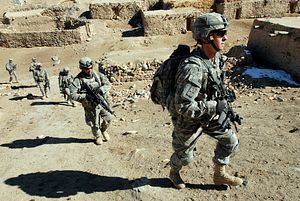Against the backdrop of the stalled Bilateral Security Agreement (BSA) with the United States, the North Atlantic Treaty Organization (NATO) began negotiations with the government of Afghanistan for a Status of Forces Agreement (SOFA) that would provide a legal basis for international troops’ continued presence in Afghanistan beyond next year.
NATO Secretary General Anders Fogh Rasmussen said in a statement that the SOFA agreement would see a NATO mission “train, advise and assist the Afghan National Security Forces after 2014, as agreed with the Afghan government at the 2012 NATO Summit in Chicago.” According to Rasmussen, negotiations are taking place between NATO senior civilian representative Maurits Jochems and Afghan national security adviser Rangin Spanta.
NATO made clear that the SOFA could only be concluded contingent on the signing of the BSA with the United States – something Afghan President Hamid Karzai has been reluctant to do for a variety of reasons, ranging from careful politicking to nationalism. According to Bloomberg, “U.S. Defense Secretary Chuck Hagel was ‘pleased’ to learn of the discussions while the Pentagon pressed for Afghan President Hamid Karzai to sign the bilateral agreement.”
NATO’s insistence that the Kabul government conclude the BSA with the United States adds another powerful voice to a growing regional chorus interested in seeing the U.S. presence in Afghanistan endure beyond 2014, ostensibly in the interest of maintaining security. India, Pakistan and China have all supported the BSA as well.
Should the BSA be signed – something U.S. officials expect to happen before the new year – the SOFA agreement with NATO should follow soon thereafter. Karzai initially supported the notion of a BSA with the United States but grew intransigent and refused to sign it after being presented with a draft and receiving the support of the Afghan Loya Jirga. Karzai claims that the BSA should be concluded by his successor, the winner of Afghanistan’s national election for president next April.
Should the BSA not be signed, Afghanistan faces the prospect of instability given the state of preparation of the Afghan National Army and national police forces. The U.S. remains hesitant to exercise a “zero option” – a scenario where no U.S. troops remain in Afghanistan, for operational or training purposes – precisely because the Taliban and its affiliates across Afghanistan and in the Afghanistan-Pakistan borderlands would seize the moment to launch a destabilizing campaign against Kabul before the general elections. The timing of the security agreements, a few months before the elections, lends a sense of fragility to the contemporary situation in Afghanistan.































